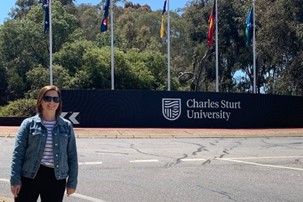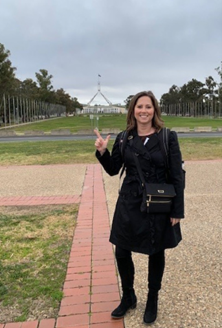 Getting the chance to research agricultural communications in another country is a dream for some; but for Courtney Meyers, it is a reality.
Getting the chance to research agricultural communications in another country is a dream for some; but for Courtney Meyers, it is a reality.
Meyers, a professor in agricultural communications at Texas Tech University, recently traveled to Australia as a Fulbright Scholar. She left the U.S. in July 2022 and will return in January 2023.
“It’s really been a wonderful project and a lifelong goal of mine to be a Fulbright Scholar. I’ve always wanted to travel and live somewhere else to explore what agricultural communications looks like in another country,” Meyers said.
Meyers currently is in Wagga Wagga New South Wales, Australia, at Charles Sturt University, as a part of the Fulbright Scholars Program. This program provides opportunities for university students, faculty, administrators, and researchers to complete international experiences to encourage a cultural exchange that leads to mutual understanding.
Meyers set three main research goals for her five-month Fulbright research program.
Her first objective is to write case studies about agricultural issues in Australia and how they are being communicated.
 “The agricultural enterprises here are extremely diverse, and they are very export minded. They export a lot of their crops and animals to other countries,” Meyers said.
“The agricultural enterprises here are extremely diverse, and they are very export minded. They export a lot of their crops and animals to other countries,” Meyers said.
According to Meyers, there are interesting examples of storytelling where buying Australian products is a sense of pride. She explained it’s a part of the national identity to support local and prioritize sustainability.
“There’s a lot of unique issues and topics here and to see how those are played out in communication efforts is interesting,” Meyers added.
The second objective of Meyers’ research is to complete a content analysis of how the media -- mainstream and agricultural -- present issues, such as climate change.
“Australia is a land of extremes, where there are bushfires one year and extreme flooding the next,” Meyers said.
The third objective of her research is to explore the potential for agricultural communications as an academic discipline.
“Ag communications currently is not offered in the sense as we have in the United States,” Meyers said. “When I talk to people who work in agricultural-communications roles, they are always excited about what that could look like and the potential to prepare more people for the industry who could communicate to the variety of stakeholders we need to reach.”
Meyers has enjoyed getting to interview Australians who work in agricultural-communications roles and those who work in higher education about the potential to introduce the subject at a collegiate level.
While in Australia, Meyers has attended several different farmer-focused events, such as field days where machinery and equipment dealers brought their latest innovations to producers. She also has attended research updates where she heard from researchers and experts who were providing information directly to farmers.
“They talked about the latest findings and trends they were noticing, giving advice and answering questions farmers had,” Meyers said.
Meyers is grateful for all the support she has received and for the ability to connect with people who are both within the industry and those that have a shared appreciation for agriculture.
“I’m really excited to get to bring this experience, and what I have learned, and the perspectives I’ve gained back to the classroom at Texas Tech to benefit my students and hopefully motivate, encourage, and inspire them to go after some big goals they have in their own lives,” Meyers concluded.
